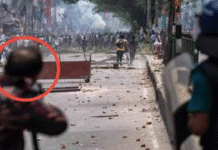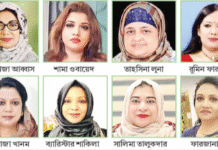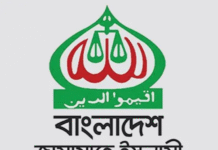
Muktadir Rashid | New Age||
Fake news, disinformation, misleading information, smear campaigns, and political propaganda in social media have risen to an alarming level in Bangladesh in recent months ahead of the national elections scheduled for early next year, disrupting the information ecosystem and causing confusion among the masses.
False news cards have been made, smear campaigns targeting politicians have been fuelled, dubious people have written opinions, deep fake or artificial intelligence has been introduced, and short videos have been produced over the months by politically affiliated people, including those involved with the ruling Awami League and the opposition Bangladesh Nationalist Party.
‘With the disinformation, mass people are largely being affected, and their ability to make informed decisions is curtailed,’ said Md Saimum Reza Talukder, senior lecturer at the School of Law at BRAC University.
He believed that the spread of disinformation and fake news basically violated the people’s rights to receive information as prescribed under Article 19 of the International Covenant on Civil and Political Rights.
Senior leadership of the ruling Awami League, the opposition BNP, and other professionals, including bankers, businesspersons, and journalists, are being targeted for smear campaigning.
Many journalists believed smear campaigning had turned into a harsh tool nowadays in Bangladesh to silence any critical reporting, impacting journalism.
The cabinet committee on law and order also, in an internal meeting with the top officials of security, intelligence, and law enforcement agencies in February, identified the spread of fake news and political propaganda as a major setback in maintaining law and order.
The law enforcement agencies later sat with Facebook authorities.
Major General Ziaul Ahsan, director general of the National Telecommunication Monitoring Centre, was present at that cabinet committee meeting.
He told New Age in the past week that misinformation and disinformation were somewhat dominating cyberspace nowadays and that they were badly affecting the state as a whole.
Ziaul, whose agency under the home ministry monitors the spread of false information, also said the amount of fake information was increasing in the run-up to the elections.
Academics and fact-checkers also said that the number of fake news stories, disinformation, and political propaganda had increased in recent months and would intensify further as a national election neared.
The latest research by fact-checking platform Rumour Scanner said that they could identify 111 fake news stories and disinformation in June, 128 in July, and 152 in August. In the past four months, they have scanned at least 544 pieces of misinformation, disinformation, and rumour.
Of those, the Rumour Scanner identified 36 political rumours in June, 38 others in July, and 58 in August.
‘As Bangladesh’s national election nears, disinformation campaigns intensify. Political parties and their supporters actively spread propaganda independently and systematically in an organised way. Fake profiles, pages, and financial investments amplify these efforts to reach more targeted people,’ said Shohanur Rahman, a senior fact-checker at Rumour Scanner.
He said that in recent times, after the announcement of the US visa policy, they had witnessed a surge in disinformation on visa sanctions.
‘Currently, we detect three to seven political rumours daily, a number expected to rise.’
Apart from this, at least 15 pieces of misinformation were spread between May and August about the visa policy introduced by the United States for Bangladesh.
Following the announcement from the State Department in September over the application of US visa policy for Bangladeshis, fact-checkers found numerous Facebook profiles spreading lists of people facing visa restrictions.
Both the State Department and the US embassy in Dhaka said that they would not release any list of people facing visa restrictions.
FactWatch, an independent fact-checking entity, found news related to the detention of prime minister Sheikh Hasina’s son and ICT advisor Sajeeb Ahmed Wazed in the US to be fake news.
The fact-checking entity also debunked another fake news article claiming that a leaked video of BNP politician Rumeen Farhana had gone viral, in which the daily Prothom Alo logo was used to make it credible.
Ruling lawmaker Mohammad e Arafat shared a decade-old photo blaming the BNP for violence on July 29. On September 21, Prothom Alo, on their Facebook page, debunked the fake news.
Another fact-investigation platform, Dismislab, identified 214 unique pieces of misinformation disseminated on different platforms between July 1 and August 20. It said that 58.9 per cent of those pieces of information were related to
politics, while others were related to education, entertainment, and sports, among others.
Qadaruddin Shishir, an editor in AFP’s Dhaka bureau who coordinates AFP Fact Check’s Bangla-language site, said fake news or disinformation was being spread by both major political rivals in the country, and the number was increasing ahead of the coming elections.
He said that news cards using the logos of leading or mainstream news outlets were being circulated very often.
Hundreds of articles praising Bangladeshi government policies, apparently by independent experts, have appeared in national and international media, but the authors have questionable credentials, fake photos, and may not even exist, an AFP investigation found.
Quoting commentators, AFP said it was evidence of a sustained campaign of disinformation by unknown actors ahead of elections, which appeared to be intended to benefit the government of prime minister Hasina.
Abdullah Al Mamun, a professor of mass communication and journalism at Rajshahi University, feared that the number of fake news stories and disinformation would intensify further in the run-up to the election.
He believed that the situation would not improve until the media acted professionally and refrained from indulging in clickbait journalism.
In early August, Bangladesh’s Election Commission met with representatives of Facebook’s parent company to seek the social media giant’s support in removing political posts deemed disinformation during the run-up to national polls.
A senior official serving under the home ministry told New Age that a Facebook official told them in a meeting that the number of requests from the Bangladesh government was almost equal to all complaints they received across the world.
According to the German company Statista, in 2021, the number of YouTube users based in Bangladesh amounted to approximately 28.53 million, while Facebook users were estimated to reach 25.57 million and Twitter users 1.26 million.
The cabinet committee on law and order’s chair, AKM Mozammel Huq, said they wanted social media platforms to set up their offices in Bangladesh to bring transparency to online content in ‘the line of the law’ of the land.
A senior official who attended the meeting told New Age that Facebook responded to requests made by the government, but YouTube and Twitter seemed indifferent.









